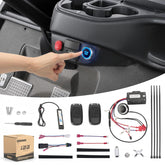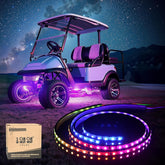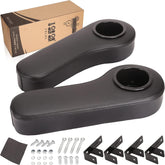Charger for Golf Cart Battery: Essential Tips for Proper Charging and Maintenance
Choosing the right charger for your golf cart battery can seem hard. But, it's essential for keeping your vehicle running well. A reliable charger not only powers your cart but also extends the life of your batteries. There are many options. They include chargers for different voltages and battery types. It's crucial to pick one that matches your golf cart.
I remember struggling with my golf cart's battery life before I switched to a high-quality charger. Suddenly, my cart was more reliable. I could play multiple rounds of golf without any issues. These chargers come in different forms. For example, there are 48V golf cart chargers. They are versatile and often used for Club Car and EZGO models.

Understanding Golf Cart Battery Chargers
Choosing the right charger for your golf cart batteries ensures they last longer. It also ensures they perform their best on the course. I'll cover the different types of chargers, selecting the right voltage, and ensuring the connectors are compatible.
Types of Chargers
On-board chargers are installed within the golf cart. They are convenient as you don't have to worry about carrying an external charger. Yet, they can add weight to the cart.
Off-board chargers are external units you plug into your cart when needed. These are generally lighter since they are not carried with the cart. They can easily be replaced or upgraded.
Both types have their place, so choosing depends on your needs. For instance, if your cart is used infrequently, an off-board charger might be more practical.
Selecting the Right Voltage
Choosing the right voltage is key to maintaining your batteries properly. This depends on the type and number of batteries your cart uses.
- 6V, 8V, and 12V batteries are common, and the cart's total voltage is usually 24V, 36V, or 48V.
- A 36-volt cart typically uses six 6-volt batteries, and a 48-volt cart usually uses six 8-volt batteries or four 12-volt batteries.
Matching the charger to your voltage ensures efficient charging and prevents damage. For a 36-volt cart, use a charger rated for 36 volts. This principle applies to 24-volt and 48-volt systems as well.
Charger Connectors and Compatibility
Compatibility with your cart's connector type is crucial. Ensure the charger's plug fits your cart's port. Some chargers are designed with universal connectors, but always verify before purchasing.
Compatibility with battery types is another factor. Lead-acid batteries require different charging profiles compared to lithium batteries. Using the wrong charger could hurt battery performance. It could also create safety risks.
Regularly checking and maintaining connections helps, too. Bad connectors cause slow charging. They can also harm the charger or batteries. Always ensure connections are secure and clean to support optimal performance.

Features and Benefits of High-Quality Chargers
When looking for a high-quality charger for your golf cart battery, focus on advanced technology. Look for safety features and a durable design. These key aspects ensure optimal performance, safety, and longevity.
Advanced Charging Technology
High-quality chargers utilize advanced charging technology to optimize performance and efficiency. Smart chargers automatically adjust the charge rate to match your battery's needs. This feature helps in maintaining the health of lithium-ion batteries, offering a longer lifespan.
Some chargers come with an automatic voltage detector. This ensures you're always charging at the right voltage.
Another handy feature is the free Bluetooth app, such as the ChargerConnect app. It lets me track charge progress and get alerts on my phone. This makes charging easier to use.
Safety and Maintenance Features
Safety should never be compromised. Top-tier chargers are designed with several safety features. An automatic shut-off feature prevents overcharging, which can extend the battery's life. This is especially useful for preventing damage to sensitive components.
Weatherproof designs protect against environmental factors. Chargers like these are often waterproof and even drop-proof. This adds extra safety when they are used in various conditions. Water-resistant models are crucial if you plan to use your golf cart in wet environments.
Some models include built-in diagnostics that alert me to potential issues early. This proactive approach ensures that needed maintenance is found and fixed quickly. It reduces downtime and extends my battery's usability.
Durability and Design
Durability is key for a charger. This is especially true if it will be used often or carried. Compact and rugged designs make these chargers ideal for golf carts. They're built to withstand rough usage and harsh conditions. Chargers with a weatherproof design can handle outdoor storage well. They can handle varied weather.
Best Practices for Charging Your Golf Cart
When charging your golf cart, following a few key practices can help extend the life of your battery. This involves using proper charge techniques and consistent maintenance.
Proper Charging Techniques
First, always refer to the owner's manual. Each golf cart may have specific requirements for charging.
Ensure your golf cart is parked in a safe, level area before charging. Turn off the ignition and remove the key to prevent any electrical hazards. Then, connect your golf cart battery charger securely to the charging plugs.
Always check the water levels in the battery system. Low water levels can cause damage. Add distilled water if needed before charging.
Using the correct charging algorithms is crucial. Different batteries may require different charge profiles. Many modern chargers have built-in algorithms. They adjust the charge based on the battery type.
Avoid using your golf cart while the batteries are charging. This can cause incomplete charging cycles. It leads to hard sulfation, which shortens the battery’s life.
For maintenance, use a trickle charger or maintainer if your golf cart remains idle for extended periods. This keeps the batteries in good health without overcharging them.
Remember, fully charge your batteries after each use to prevent drainage and keep them performing at their best. This will help you maintain your batteries' longevity and reliability. Keep safety in mind and follow these practical tips for charging your golf cart effectively.

Navigating the Market: Chargers and Accessories
Buying a charger for a golf cart battery involves understanding your needs, budget, and finding the best deals. Knowing what to look for and where to find it can make all the difference.
Assessing Your Needs and Budget
When choosing a charger, consider the voltage and type of charger that fits your golf cart. Electric golf carts typically use either 36-volt or 48-volt systems. You must match the charger's voltage to your cart's battery.
Figure out if you need extra features. Bluetooth is available in models like the Lester Summit II. It lets you monitor charging through a Bluetooth app. This can be handy for keeping tabs on battery health.
Set a budget. Prices vary widely based on features and manufacturers. Higher-end chargers with advanced features will cost more.
Finding the Best Deals and Offers
To get the best deals, start by comparing prices across multiple retailers. Sites like Amazon offer competitive prices and often list customer reviews that can guide your decision.
Look for bundles or deals on accessories. Some sellers include extras like extension cords or connectors, which can save you money. A good baking soda cleaning kit might also be included to maintain battery terminals.
Check if the seller offers flexible payment plans. Monthly payments with 0% APR can help manage the cost of higher-priced items. Reputable brands often have their own stores, like 10L0L, which might offer exclusive deals or extended warranties.
Finally, ensure you read the return and warranty policies. A solid warranty from the manufacturer can be a lifesaver if anything goes wrong. Always buy from trusted suppliers to avoid counterfeit products.
Frequently Asked Questions
When looking for a charger for your golf cart battery, it's important to understand the differences between chargers. You should also understand how they work and what needs they meet. Here are the key considerations.
What factors should I consider when purchasing a golf cart battery charger?
When buying a charger, look at the voltage and amperage to match your golf cart's battery. Compatibility with your battery type, whether it's lead-acid or lithium, is crucial. Safety features like automatic shut-off can prevent overcharging.
How does a 36-volt charger differ from a 48-volt golf cart battery charger?
A 36-volt charger is designed for golf carts with a 36-volt battery system, whereas a 48-volt charger suits a 48-volt system. Using the correct charger ensures efficient charging and longevity of the battery.
Can I use the same charger for different brands of golf carts?
You can use the same charger for different brands if the voltage and connector types match. Always check the manual of both the charger and golf cart to ensure compatibility.
What are the signs that indicate it's time to replace my golf cart's battery charger?
If the charger doesn't turn on, overheats, or takes too long to charge, it might need replacing. Inconsistent charging cycles and unexplained battery drainage are also red flags.
Where should I look when trying to find a reliable golf cart battery charger near me?
Local golf supply stores often carry reliable chargers, as do online retailers like Amazon or specialized websites. Checking customer reviews and ratings can help identify trusted products.
Are there any special requirements for charging an EZGO golf cart battery?
EZGO golf carts might need unique connector types. They also might have unique voltage settings. Refer to the EZGO manual for precise instructions on selecting and using the correct charger.









